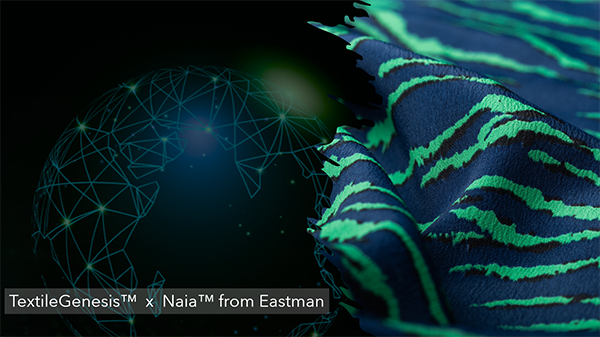
Eastman says its partnership with TextileGenesis will enable a way to share traceability information about its Naia cellulosic yarns and fibres across the entire supply chain.
Using advanced digital technologies and supply chain modelling, TextileGenesis traces every phase of garment making, citing farm and factory locations and every process used to get a product from point of origin to final retail destination.
Made with the vision to inspire more eco-friendly fashion and home textiles, Naia cellulosic yarns and fibre are responsibly sourced from sustainably managed pine and eucalyptus forests to ensure no deforestation of ancient and endangered forests. For further sustainability, Naia Renew gives brands the opportunity to offer circularity at scale, Eastman says, adding Naia Renew is produced from 60% sustainably sourced and traceable wood pulp and 40% certified recycled waste materials.
Claudia de Witte, sustainability leader at Eastman Textile Fibers, notes understanding where materials come from is a vital part of a brand’s sustainability story.
“By working with TextileGenesis we’re giving our brand partners a Naia travel log from factory floors to retailers’ doors, complete with snapshots that detail its journey across the value chain. And in the end, this gives consumers the information they need to make ethical decisions about their fashion.”
The TextileGenesis system works by engaging all tiers of a supplier’s ecosystem to create traceability based on five key principles:
- Verifying the point of origin by digitising any textile asset (e.g., fibre, filament, yarn, fabric, garment) to ensure there is no double-counting
- Capturing real-time shipment transactions across supply tiers
- Value chain modelling, using augmented intelligence to gain insight on complex textile value chains along with wastage and loss factors
- Creating a cross-industry ecosystem by working with organizations, exchanges, established protocols, and sustainable fibre producers — applying premier environmental, social and governance (ESG) standards
- Supporting independent, third-party verification, including by those that perform forensic fibre audits and verify the ESG credentials of suppliers
Amit Gautam, TextileGenesis CEO and founder adds: “Traceability is fast becoming a key prerequisite to sustainable product offering. Our partnership with Eastman will create unprecedented supply chain traceability for Naia fibres and filament towards retail brands. It moves forward the sustainable fibres industry to create end-to-end traceability.”
Last month, Supima announced a strategic partnership with TextileGenesis to establish a new industry benchmark platform for cotton authentication.



